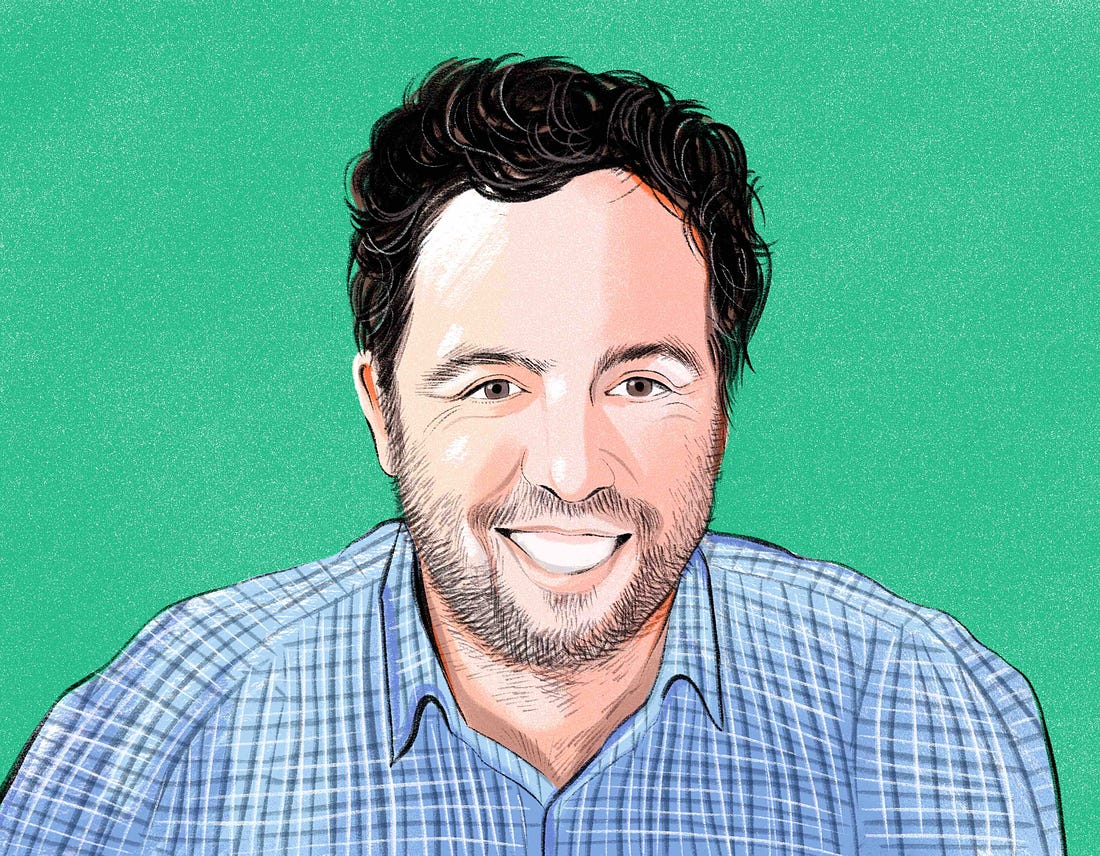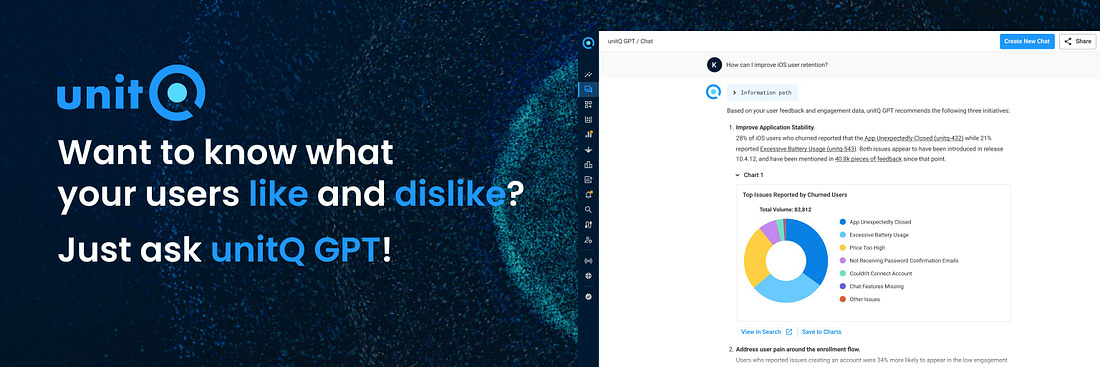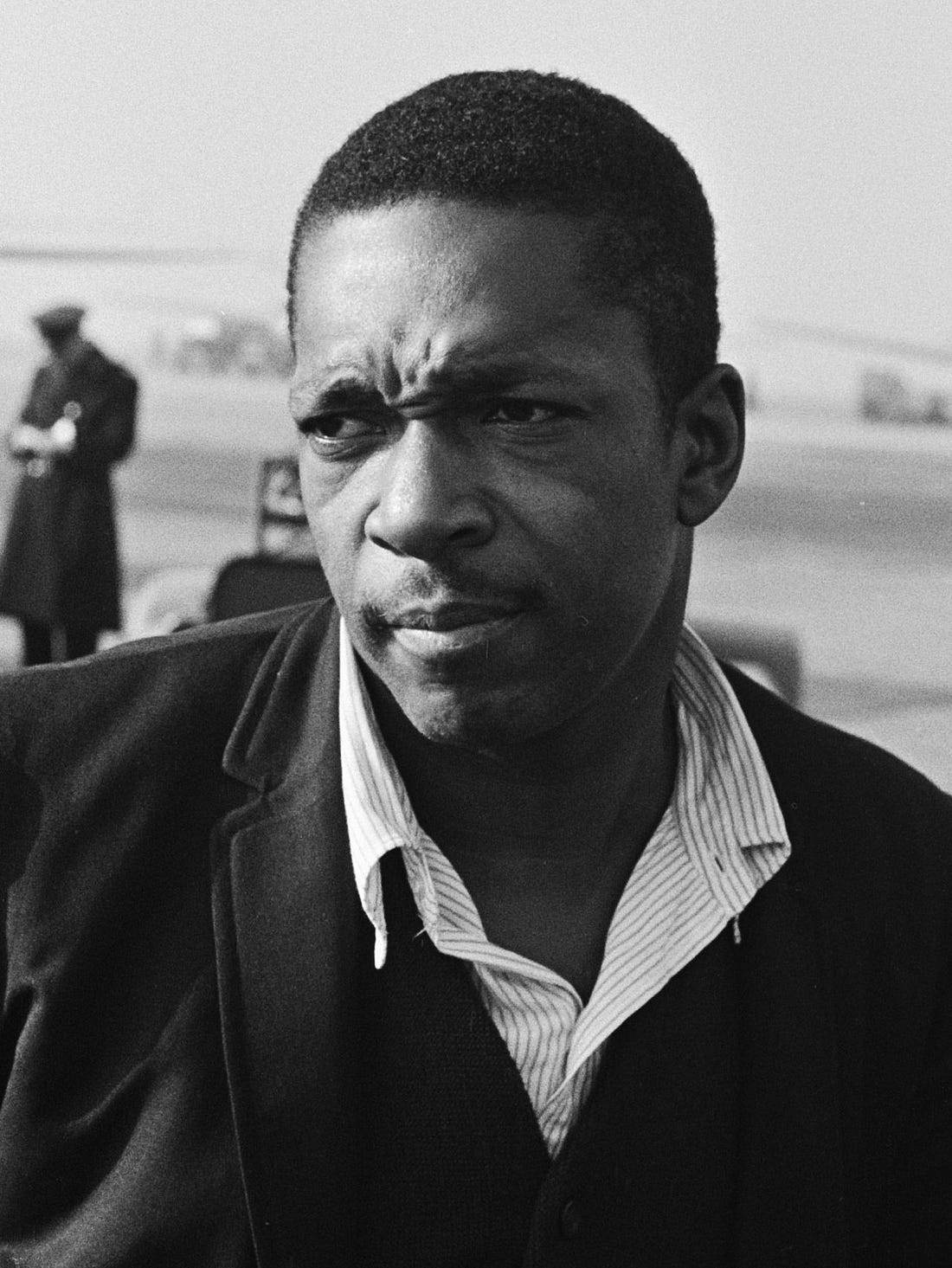The Generalist - Modern Meditations: Danny Rimer
 Illustration by Eleanor Taylor Friends, Danny Rimer has invested in some of the best-known companies of the past generation. His hits include Figma, Discord, Glossier, Notion, Patreon, Etsy, and many others. That string has cemented Danny as one of venture’s most productive investors and made him a regular on Forbes’ Midas List. What is perhaps more interesting than Danny’s success is the manner in which he has achieved it. Every craft is a blend between “art” and “science.” (Even science has its aesthetics and painting, its methodologies.) Danny is an investor who uses his love of art and appreciation for beauty to elevate and inspire his practice. While deploying capital can feel like a cold, clinical job from the outside, Danny has found a way to embody it, artfully. Today’s piece is part of our “Modern Meditations” series that asks exceptional people unusual questions. In this edition, Danny shares his love for jazz musician John Coltrane, his childhood affection for a French cultural minister, the market signals that validated his investment in Figma’s Dylan Field, and the relative insignificance of assessing startups by their total available market. An ask: If you liked this piece, I’d be grateful if you’d consider tapping the ❤️ in the header above. This helps us understand which pieces you like most, and what we should do more of. Thank you! Brought to you by unitQ Introducing unitQ GPT: The world’s first generative AI engine for measuring the quality of your products, services and experiences. unitQ GPT revolutionizes how product builders, engineers, and support leaders understand user feedback in real time to build superior products, fix bugs faster and resolve support issues at scale. Just ask a question and get an answer based on granularly categorized, AI-driven user insights.
Just ask!
Actionable insightsIf you only have a few minutes to spare, here’s what investors, operators, and founders should know about Danny Rimer’s meditations.
There is beauty in something well-made. The fine fit of a tailored suit. The delicate stitching of a vibrant rug. The mechanical elegance of a well-tuned watch, ticking silently. The same aesthetic laws that govern these objects – and innumerable others – apply to the business world, too. There is such a thing as a beautiful, elegant business. Not only in those aspects that might meet the eye – the palpable product, gilded logo, or savvy marketing copy – but in those that don’t: the contours of a business model, the architecture of information flows, the fiber and color of culture. For those willing to look, to study with an appreciative eye, even the seeming mundanity of a B2B SaaS product can possess a kind of aesthetic grace. Danny Rimer is perhaps the venture world’s great aesthete. Though he is fundamentally a manager of money (that vulgar thing), he approaches his work with the inquisitiveness and appreciation of a connoisseur. While other venture investors may attack a startup’s total addressable market, Danny prefers to engage with the creations themselves – and speak to the founders, the artists, that have brought them to life. It is an approach that comes naturally to Danny. From a young age, he developed a great appreciation for culture that he has cultivated over the years. In addition to his work as a partner at Index Ventures, Danny serves as a board member for the Tate Museum and the Smithsonian National Museum of African American History and Culture. As it happens, it has also proven an extremely successful approach. Over more than two decades at Index, Danny has invested in some of the most successful startups of the past couple of generations: Etsy, Figma, Glossier, Discord, Notion, and many others. That track record has made him a mainstay of the Midas List, Forbes’ ranking of venture capital’s best investors. In today’s piece, Danny shares what he looks for in founders, why TAM doesn’t matter, and how he thinks about the importance of art. These are his meditations. What would you be doing if you didn’t work in tech?I started my life dreaming of becoming a cultural ambassador or cultural minister. I loved the idea of bringing the citizens of a country together. That’s not something most children dream of. But I was raised in Geneva, Switzerland, a few hundred kilometers from the French border. Growing up, France was the country you looked at most. During that time, France was in the heyday of President François Mitterrand and his government’s focus on cultural policy. Much of that was spearheaded by the Minister of Culture, Jack Lang, who was something of a celebrity during those days. He was an early inspiration for me. One of Lang’s achievements has particularly stuck with me: his championing of I. M. Pei’s “Louvre Pyramid.” Commissioning Pei to construct the gateway to The Louvre was a controversial choice for Lang and one that was met with resistance and criticism. After all, the Louvre was France’s most important national monument, built on the sacred ground of kings — how could Lang let anyone, let alone a Chinese citizen, add such an unusual structure on top? It was blasphemous.  I. M. Pei's "Louvre Pyramid" (Wikipedia) Until it wasn’t. Pei’s modernization of an ancient form – the pyramid – is now widely appreciated. It’s a pride of French architecture, and it wouldn’t have existed if Jack Lang hadn’t seen the big picture at a time when few others did. By staying true to his convictions, Lang helped manifest something that has brought the country together to celebrate all kinds of art in a way that’s become timeless and synonymous with France. It’s a fantastic example of the payoff that comes with taking great risks. As an investor, that’s something I try and practice every day. Which current or historical figure has most impacted your thinking?Several folks come to mind, but the jazz artist John Coltrane is one icon that stands out. He created many phenomenal albums, including the one I would want if I were ever to find myself stranded on a desert island: A Love Supreme. It actually impacted me so much that I convinced my wife to name her yoga center after it. If I take a step back, my deep respect for Coltrane stems from a few places that have collectively influenced my investment filter. He exemplifies many of the key traits I look for in founders.  Jazz legend, John Coltrane (Wikipedia) For one thing, I spend my time looking for disruptors. Without a doubt, Coltrane majorly disrupted the conversation of jazz, expanding it to include the improvisation we associate with it today. Secondly, Coltrane felt his art at a deep, fundamental level. He actually composed A Love Supreme in a garage after overcoming drug and alcohol abuse, sequestering himself until he felt comfortable releasing the album. It’s the best work of music I’ve ever heard, and it really speaks to Coltrane’s soul connection with his music. That sense of connection is something I look for in founders. Am I convinced they’ve been placed on this planet to go after this opportunity? Will they be pursuing it irrespective of whether I or anyone else will back them? The founders I invest in put the time in, but they can’t be hacking away at something forever — value only comes after something is shipped. Great founders understand when something is ready for others to consume. What is the most significant thing you’ve changed your mind about over the past decade?Over the last ten years, I’ve learned to trust my instinct a lot more. We’ve all been trained to be analytical, to derive the correct response from first principles. Of course, there’s a place for that; you have to do your due diligence. But now, I spend more time going with my gut as opposed to keeping it at bay. At Index, we have an equal partnership, so if I want to make an investment that seems pretty out there to my partners, I have to bang my fist on the table hard. And there have been numerous occasions where, for a lot of rational reasons, it didn’t make sense to invest. But accepting my instincts has had a tremendous impact on my investments. When I trust my instinct, it usually ends up being the right thing to do. Take Figma, for example. When I met Dylan, he was 19, and Evan, who had been his teaching assistant at Brown, was just 22. Neither of them had ever really built anything or worked full-time at a company. There was no “proof” they were going to do well. But my instinct told me they were placed on this earth to build the most important product design company out there. I was able to convince my partners it was worth backing. Discord was another gut-based example. If you talk to Jason, he’ll tell you that Index invested in Discord based on just two charts related to retention and churn. We obviously did our own broader analysis behind the scenes, but meeting and spending time with Jason and validating the data those two slides contained – that led us to our investment. Level up your investing IQ with Generalist+ If you love hearing from exceptional investors like Danny Rimer, join our premium newsletter, Generalist+. For just $22/month, you’ll unlock exclusive series designed to make you a better investor and sharper thinker. That includes our conversation with venture legend Reid Hoffman on funding Airbnb and missing Stripe. What craft are you spending a lifetime honing?Being the best partner to entrepreneurs. Some consider investors “coaches,” but I don’t think “coach” is the right term. It’s hard to be a coach when you’re an investor. I come with my own agenda; I’m not independent. I have a vested interest in companies doing very well, and I have a fiduciary duty vis-a-vis my investors. That’s why I prefer the term “partner.” To be the best partner to entrepreneurs, you can’t just be their biggest fans. You need to provide tough feedback in the most effective and transparent way. Ironically, I’ve found that the fastest way to build a strong, transparent relationship with founders is to make myself vulnerable. I ask them to give me constructive criticism; I’m thirsty for it. And when they do, I show them I’m willing to “go there” to explore their feedback and learn from it. Going to those uncomfortable places is the key to unlocking trust. Demonstrating that you’re willing to be vulnerable helps founders feel they can, too. When I do have to have a tough conversation with a founder, I try and make sure to incorporate a strong rationale for my position. I often provide anecdotes to back up my feedback. Referring to situations I’ve been in with other entrepreneurs gives useful color and context. Founders grasp what I’m saying, but more importantly, why I’m saying it. What do you consider your greatest achievement so far?Professionally, I would say building the culture of Index. I feel very proud of the fact that Index is a different type of firm from any others out there. We beat our own drum. We are contrarian. We don't accept being an asshole in any way. Of course, culture is something that is created together. I’d say my particular contribution is a relentless desire for Index to be the best partner to the entrepreneur without compromising our personality or standards. I insist on us being the best but doing so with care. That means everyone at Index must be a “compassionate ass-kicker.” I use the word “compassion” because it’s better than empathy. Compassion gives you distance and breathing room from a problem. But you can still understand and help solve it. I say “ass-kickers” because if something’s not getting done, it needs to get done. Our team is good at that. I realize there’s something oxymoronic about this moniker, but it’s a productive tension. What is your most contrarian, high-conviction opinion?It’s probably how insignificant total available market (TAM) is as an investment criteria. So many investors anchor on TAM, and I think it’s used as a way to quell their fears. As an investor, the real challenge is saying “yes” when you want to say “no” – there are always reasons not to invest in a startup. It can be convenient to use a small TAM to validate that “no.” We have been led so wrong by trying to understand what TAM is that, as a firm, we’ve successfully acknowledged that it’s noise. In fact, paying too much attention to it harms our chances of investing in truly disruptive companies. One of my favorite examples of TAM’s irrelevance is Etsy. Early on, our peers were thinking, “How big could arts and crafts possibly be? I go to farmers markets, and maybe two or three people are polishing wooden bowls or selling earrings they’ve made in their free time. How many of those folks are there, and how many will actually use something like Etsy?” Our research told us there were something like 100,000 artisans. Not much at all in the grand scheme of things. But we expanded our view to say, what if everyone made their passion a vocation? At that point, the potential TAM was enormous. Switching our focus to the larger opportunity and the team behind Etsy helped us make an investment we never would have if we focused exclusively on TAM. A similar thing happened with Figma. We had a hunch that product design was important – this was before that opinion was commonplace. Part of our conviction in that position came from learning that Facebook paid $10,000 bonuses to employees who referred an engineer – but $15,000 for designers! Meanwhile, IBM had also adjusted their ratio of designers to engineers from one to 100 to one to 20. Those clues meant something was going on, but we didn’t know exactly what it meant for the product design market. Instead of thinking small, we thought big. We posited that every website and every mobile app would need some way for engineers, product managers, and designers to collaborate. That belief convinced us to invest. Again, if we’d focused on the size of the design market alone, we would have never made the investment. What piece of art can you not stop thinking about?There are many, many works of art that I think about often. But I will say that one of my favorite artists is Agnes Martin. I find her art to be extraordinarily uplifting, calming, and inspiring — all at the same time. You can see six of her beautiful paintings in a mesmerizing hexagonal room at the San Francisco Museum of Modern Art.  A selection of Agnes Martin pieces at the SF MOMA (Los Angeles Times) In many ways, art is the soundtrack of my life. I am constantly looking for it, seeking to surround myself with it. Being in the presence of something beautiful can elevate and inspire you. It’s also such a critical way of connecting to others, even those you might not know well. Art of all types — music, visual, poetry, fiction — can serve as a common thread. Another reason I’m drawn to observing art is because it forces you to value something totally subjective. In essence, that’s my whole job as a venture capitalist. Why is a Basquiat so much more valuable than a Keith Haring? Why is Picasso the best-known artist in global culture? Asking those questions hones my valuation skills. Ultimately, while I know I can’t create art like the masters, I enjoy recognizing its brilliance. To me, that acknowledgment and appreciation of what an artist has achieved is, in and of itself, a step toward excellence. What will the next generation do, or use, that is unimaginable to us today?The next generation will use a level of EQ that we haven't explored. If we extrapolate the impact of AI on our society, emotional intelligence will become an unbelievably valuable differentiator. Those muscles will have to be developed and used in ways that we don’t quite understand yet. I feel that’s partially because of our focus on STEM. There’s been such an emphasis on it. I don’t think we’ve really appreciated what the end result of our commitment to STEM will be. Beyond encouraging extreme innovation, I think it may have led to underdeveloped emotional intelligence. Our descendants will adapt to differentiate themselves from increasingly intelligent technologies. If you had the power to assign a book for everyone on earth to read and understand, which book would you choose?One of my closest friends happens to be a wildly talented poet named Kevin Young, and he’s written about twenty poetry books I feel everyone should read. What’s unique about his work is that he uses very accessible language to paint crystal-clear pictures with his poems. Because I’m so close to art, I find form to be incredibly important, and poetry is one of the few art forms that goes straight to the heart. You can’t really try to dissect every word and find meaning — and that’s not the point. A lot of the message of a poem is in its rhythm and in the reader appreciating the beauty of the sound of the words, and that’s especially true with Kevin’s poems. Kevin is an inspiration, not only because he’s an extremely accomplished writer, but because he also is a great preserver of culture — he’s the Director of the Smithsonian’s National Museum of African American History and Culture in Washington DC. In my opinion, if you pick up any of Kevin's books or visit any historical place he’s had an impact on, you're in good shape. How will future historians describe our current era?This time in history will be viewed as an era of incredible innovation at an unprecedented pace. But it will also be a time of incredible polarization — from a social class, ideological, and environmental standpoint. A time when the speed of change was on the brink of being uncontrollable. Thankfully, I think we already see plenty of examples of folks really digesting what’s happening in the world and wanting to reverse its course. I’m an eternal optimist, so I think we will eventually be able to control that change. The next few decades will tell the story of us wrangling with its speed. PuzzlerRespond to this email for a hint.
Last week’s riddle was composed by yours truly. It also proved rather difficult with just two readers finding the correct answer: Nathan M and Adam P. (Credit also to Brandon H, who came close). Here was the teaser in question:
The answer? The letter “c.” A brief explanation:
Tricky! Until next time, Mario You're currently a free subscriber to The Generalist. For the full experience, upgrade your subscription. |
Older messages
The Braintrust: What should you have invested in sooner?
Tuesday, November 7, 2023
Eight unicorn founders reflect on product/market fit, working on Capitol Hill, hiring leaders, and maintaining mental health.
Last chance! Early bird pricing ends in 24 hours.
Sunday, November 5, 2023
Act now to lock in our best pricing for Generalist+, our new premium newsletter.
What makes a great acquisition?
Thursday, November 2, 2023
The common wisdom is that most M&A goes south, with reported failure rates of up to 90%. How can CEOs tip the scales in their favor?
Letters to a Young Investor with Reid Hoffman
Tuesday, October 31, 2023
The legendary investor shares stories on Airbnb, Stripe, avoiding mistakes, and developing a “theory of the game.”
Become a better investor – one email at a time.
Sunday, October 29, 2023
An investment memo for Generalist+.
You Might Also Like
🚀 Ready to scale? Apply now for the TinySeed SaaS Accelerator
Friday, February 14, 2025
What could $120K+ in funding do for your business?
📂 How to find a technical cofounder
Friday, February 14, 2025
If you're a marketer looking to become a founder, this newsletter is for you. Starting a startup alone is hard. Very hard. Even as someone who learned to code, I still believe that the
AI Impact Curves
Friday, February 14, 2025
Tomasz Tunguz Venture Capitalist If you were forwarded this newsletter, and you'd like to receive it in the future, subscribe here. AI Impact Curves What is the impact of AI across different
15 Silicon Valley Startups Raised $302 Million - Week of February 10, 2025
Friday, February 14, 2025
💕 AI's Power Couple 💰 How Stablecoins Could Drive the Dollar 🚚 USPS Halts China Inbound Packages for 12 Hours 💲 No One Knows How to Price AI Tools 💰 Blackrock & G42 on Financing AI
The Rewrite and Hybrid Favoritism 🤫
Friday, February 14, 2025
Dogs, Yay. Humans, Nay͏ ͏ ͏ ͏ ͏ ͏ ͏ ͏ ͏ ͏ ͏ ͏ ͏ ͏ ͏ ͏ ͏ ͏ ͏ ͏ ͏ ͏ ͏ ͏ ͏ ͏ ͏ ͏ ͏ ͏ ͏ ͏ ͏ ͏ ͏ ͏ ͏ ͏ ͏ ͏ ͏ ͏ ͏ ͏ ͏ ͏ ͏ ͏ ͏ ͏ ͏ ͏ ͏ ͏ ͏ ͏ ͏ ͏ ͏ ͏
🦄 AI product creation marketplace
Friday, February 14, 2025
Arcade is an AI-powered platform and marketplace that lets you design and create custom products, like jewelry.
Crazy week
Friday, February 14, 2025
Crazy week. ͏ ͏ ͏ ͏ ͏ ͏ ͏ ͏ ͏ ͏ ͏ ͏ ͏ ͏ ͏ ͏ ͏ ͏ ͏ ͏ ͏ ͏ ͏ ͏ ͏ ͏ ͏ ͏ ͏ ͏ ͏ ͏ ͏ ͏ ͏ ͏ ͏ ͏ ͏ ͏ ͏ ͏ ͏ ͏ ͏ ͏ ͏ ͏ ͏ ͏ ͏ ͏ ͏ ͏ ͏ ͏ ͏ ͏ ͏ ͏ ͏ ͏ ͏ ͏ ͏ ͏ ͏ ͏ ͏ ͏ ͏ ͏ ͏ ͏ ͏ ͏ ͏ ͏ ͏ ͏ ͏ ͏ ͏ ͏ ͏ ͏ ͏ ͏ ͏ ͏ ͏ ͏ ͏ ͏ ͏
join me: 6 trends shaping the AI landscape in 2025
Friday, February 14, 2025
this is tomorrow Hi there, Isabelle here, Senior Editor & Analyst at CB Insights. Tomorrow, I'll be breaking down the biggest shifts in AI – from the M&A surge to the deals fueling the
Six Startups to Watch
Friday, February 14, 2025
AI wrappers, DNA sequencing, fintech super-apps, and more. ͏ ͏ ͏ ͏ ͏ ͏ ͏ ͏ ͏ ͏ ͏ ͏ ͏ ͏ ͏ ͏ ͏ ͏ ͏ ͏ ͏ ͏ ͏ ͏ ͏ ͏ ͏ ͏ ͏ ͏ ͏ ͏ ͏ ͏ ͏ ͏ ͏ ͏ ͏ ͏ ͏ ͏ ͏ ͏ ͏ ͏ ͏ ͏ ͏ ͏ ͏ ͏ ͏ ͏ ͏ ͏ ͏ ͏ ͏ ͏ ͏ ͏ ͏ ͏ ͏ ͏ ͏ ͏ ͏ ͏ ͏
How Will AI-Native Games Work? Well, Now We Know.
Friday, February 14, 2025
A Deep Dive Into Simcluster ͏ ͏ ͏ ͏ ͏ ͏ ͏ ͏ ͏ ͏ ͏ ͏ ͏ ͏ ͏ ͏ ͏ ͏ ͏ ͏ ͏ ͏ ͏ ͏ ͏ ͏ ͏ ͏ ͏ ͏ ͏ ͏ ͏ ͏ ͏ ͏ ͏ ͏ ͏ ͏ ͏ ͏ ͏ ͏ ͏ ͏ ͏ ͏ ͏ ͏ ͏ ͏ ͏ ͏ ͏ ͏ ͏ ͏ ͏ ͏ ͏ ͏ ͏ ͏ ͏ ͏ ͏ ͏ ͏ ͏ ͏ ͏ ͏ ͏ ͏ ͏ ͏ ͏ ͏ ͏ ͏ ͏ ͏ ͏ ͏ ͏ ͏